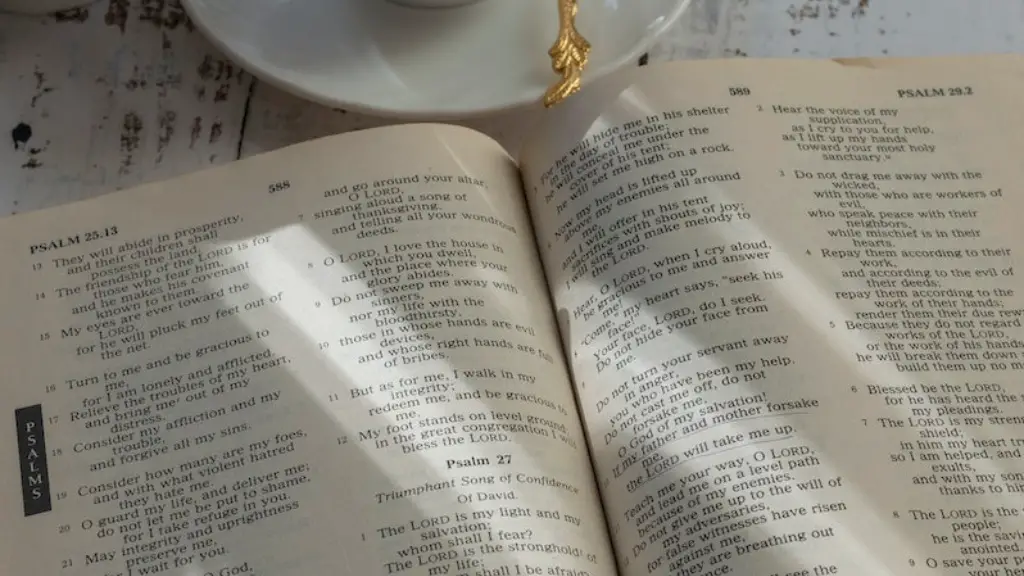Meaning of Selah
Selah is an important Hebrew word used in the Bible that appears over seventy times in various psalms, hymns and prayers. The precise meaning of Selah is somewhat shrouded in mystery and debate. Most Biblical scholars agree that it is used to introduce a pause, often of a musical nature, in the psalms and prayerful utterances of the Israelites. This pause allows for meditation and reflection on the words that have been spoken.
The first use of the word Selah in the Bible can be found in Psalm 3:2 where it is used as an instruction to meditate on the Lord. Other uses appear throughout the Psalms, for example; Psalm 48:3, 8 and Psalm 75:3. It is believed that in some cases the word may have been used to indicate the start of a musical interlude.
The Theological Meaning Behind Selah
The theological meaning behind the word selah is thought to signify a pause in the text that encourages contemplation and meditation in the reader. For this reason, many interpreters suggest that the word is a reminder to the reader to pause and ponder on the words and their implications.
Throughout scripture, there are numerous examples of God revealing his will to his people and Selah is often used as a call to reflect on this and prepare to obey. In Psalm 39:3, for example, the presence of Selah emphasizes the importance of meditating on the Lord’s commands. Similarly, in Psalm 63:4 and in the book of Habakkuk, Selah is used to invite the reader to pause and reflect on God’s promises.
Symbolic Meaning In Context
In addition to its theological implications, Selah also has a symbolic meaning within Biblical texts. This symbolic meaning is revealed in certain contexts which demonstrate the importance of engagement with the divine. By emphasizing the importance of prayer, confession and meditation in the context of Selah, the writers are empowering the reader to engender spiritual growth and meaningful relationship with God.
In Psalm 3:2, for example, Selah is used in reference to the Lord’s power and protection. Meanwhile in Psalm 39:3, it is used as a reminder to meditate on the Lord’s will and guidance. In both of these examples, Selah is used to direct the attention of the reader toward the Lord and His promises.
Awareness of The Present Moment Through Selah
Selah can also be interpreted as a reminder for the reader to be aware and mindful of the present moment. Throughout scripture there are various references to the importance of being fully engaged with the Lord and in the present moment of life. In Psalm 4:4, for instance, Selah is used to invite the reader to devote themselves to the Lord and his presence. By prompting the reader to pause and to meditate on the Lord’s will, Selah encourages meaningful and mindful engagement with the divine.
Conclusion
From its first use in the Bible, the word Selah has signified an invitation for the reader to pause and to contemplate the text. By incorporating a pause into the text, Selah serves as an entranceway into the world of spiritual contemplation and prayer. Through the symbol of Selah, the reader is reminded of the power of meditation and the rewards of meaningful engagement with the divine.
The Praise of God with Selah
Selah is also used in the Psalms to encourage the reader to praise and thank the Lord. In Psalm 3:2, for example, Selah is used to emphasize the power of praising God and thanking Him for His protection. Similarly, in Psalm 48:10 and in the book of Lamentations, Selah is used to encourage the reader to voice their gratitude to the Lord for His mercy and grace. By emphasizing the importance of praise and thanksgiving, Selah serves to support the reader’s religious journey and relationship with the divine.
The Symbolism of Selah in Jewish Liturgy
In addition to serving as an invitation to reflect on the text and engage with the divine, the symbol of Selah has a deep and special meaning within Jewish liturgy. Many Jewish commentators believe that Selah symbolizes the pause and contemplation that occurs during worship. During these moments of reflection, Jews are reminded of God’s presence and of their need for Him.
In Psalm 22:3, for example, Selah is used to encourage the reader to pause and to spend time in silent reflection with the Lord. Similarly, in Psalm 40:17, Selah is used to prompt the reader to dedicate themselves to worshipping and praising the Lord. By emphasizing the importance of prayer and meditation within religious practice, Selah serves to strengthen the bond between the believer and God.
Selah in Times of Suffering
Selah is also used as a reminder to seek strength and comfort from God during suffering and difficult times. In Psalm 38:15, for instance, Selah is used to encourage the reader to draw near to God and to seek comfort in His protection and love. Similarly, in Psalm 3:2, Selah is used to remind the reader that despite the trials that life may bring, the Lord’s presence and power will remain with them. By inviting the reader to draw closer to the Lord, Selah serves to reinforce a meaningful relationship with the divine.
A Guide for Meditation and Reflection
Ultimately, Selah serves as a guide for meaningful meditation and reflection. By providing the reader with an opportunity to pause and contemplate the words of scripture, Selah guides the believer towards a closer relationship with God. Through its use of symbolic imagery, Selah encourages the reader to reflect on the Lord’s power and presence and to draw inspiration from the text. As such, Selah is a powerful symbol that has the potential to deepen and enrich faith.


